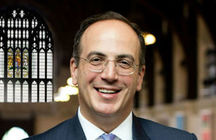Michael Ellis – 2019 Speech at Theatres Trust
Below is the text of the speech made by Michael Ellis, the Parliamentary Under Secretary of State for Arts, Heritage and Tourism, at the Theatres Trust on 22 January 2019.
I am delighted to be here with you all today.
Thank you for inviting me to speak at this important launch. Let me first take the opportunity to thank the Theatres Trust for your contribution to arts and culture. You have continuously campaigned to ensure that theatre buildings, many of them with historical and cultural significance, are protected for generations to come.
It is vital that we continue to invest in arts and culture. This investment can help develop lifelong passions and create new opportunities for work.
Creativity, arts and heritage make our communities better places to live and theatres are an incredibly important part of that.
We know that British theatre is respected for its high-quality output and the skilled professionals, both on and off the stage, who keep the industry running. Theatre in England is vibrant and thriving, with a diverse range of artists and companies producing exciting and varied work.
A theatre can be a challenging but exciting place to work and I believe there are some great opportunities in the industry.
Not just for the highly-skilled and the longstanding practitioners of their craft, but for young people just starting out who can bring a fresh perspectives and hone their expertise.
Like you, this Government and I, are fully committed to ensuring that arts and culture are accessible to everyone.
To that end, theatres as physical buildings and the institutions that support them, take a central role when it comes to accessibility.
I am sure everyone here today is in agreement that anyone should be able to experience the magic of theatre. That audience members feel part of the work.
This is why the work of the Theatres Trust and their annual Theatres at Risk register plays such a significant role in ensuring we are all aware of some of these important cultural institutions which are at threat.
It is of great credit to the hard work of the Trust and the sector that two theatres that were on last years’ list have returned to live performance use – including the one where we are today – and two others are no longer at risk.
This is great news, thank you for work and your commitment to the industry.
It is also very pleasing to see that a number of other theatres, such as the Burnley Empire and the Bradford Odeon, amongst others have been making progress in securing their futures. I very much hope that this progress continues.
We know many of the Theatres on the list are experiencing financial problems.
We also know that the cultural and creative industries make a vast contribution to our economy, accounting for over 5% of UK GVA, and the Government is committed to supporting their growth.
Culture also has a significant role to play in place-shaping, as it has important social benefits in terms of health, education, community cohesion and wellbeing. Opportunities to engage in culture – be it arts, heritage, museums or film – can have a significant impact on our lives and create places where people want to live, work and do business.
This is where the theatre, as a physical building, can play a central role in making places better areas to live, and instill a sense of community. And it may be that placemaking that can help to protect some of these cultural assets.
Evidence from the UK and other countries shows a link between cultural investment in towns and cities and economic growth. Culture, sport and heritage assets create thriving, interesting areas where people want to live, work and set-up businesses.
Creative businesses particularly benefit from clustering around cultural assets.
The impact of place-based investment in arts and culture on the attractiveness of a city or town as a place to live in and invest can also be seen in the transformative effect of Hull’s highly successful year as UK City of Culture 2017.
Since 2013, investment in Hull has amounted to £3.3 billion and the city’s employment rate and number of businesses are at the highest ever recorded rate, including over 550 new cultural jobs.
This is why it is so encouraging to see more and more theatres working outside their own walls and using their programmes to engage the communities that surround them.
It is my hope that by continuing with such innovative, entertaining and relevant programming, public interest in our theatres can only increase.
As announced by the Chancellor in the 2018 Budget Statement, DCMS will be providing £55 million as part of the Future High Streets fund, dedicated to supporting the regeneration of high street heritage assets. Those much loved historic buildings that provide a sense of place, community identity and connectedness.
£40 million of this fund will be delivered through my Department’s Arms Length Body and statutory advisor Historic England to support a high street focused version of their successful Heritage Action Zones scheme, and £15 million will be delivered through the Architectural Heritage Fund to support community groups to take ownership of heritage assets.
This programme will aim to support the economic growth and regeneration of towns and high streets across England by improving their physical and economic condition as well as increasing community and investor confidence, social cohesion and pride in our places.
The programme will help to bring about the regeneration of high streets and town centres by identifying, targeting and de-risking heritage assets as well as diversifying and optimising their uses to meet a range of community needs.
As I have set out, Government believes that place-based cultural investments should be a key part of the local growth strategy for all towns and cities in England.
This is why we have recently introduced the Cultural Development Fund, a fund for towns and cities that want to transform their urban areas through culture-led strategies. We received many strong bids from towns across England, and as some of you will know, the Secretary of State announced the winning bids on Friday last week.
Going forward, there are great opportunities for theatres to play a central role in our vision, and I am sure that with the support of Government, organisations like the Theatres Trust and Local Authorities, we can all work together to ensure that our much loved theatres can continue to thrive across the country.
I would like to thank Theatres Trust again for inviting me along today to speak to you all, and thank you all for the outstanding contributions you continue to make to our nation’s theatre.


